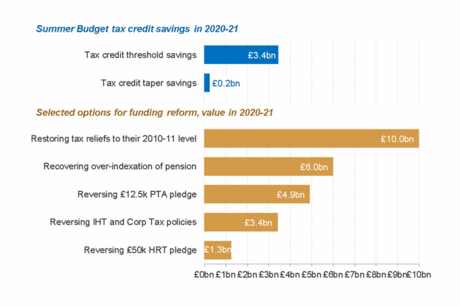Tax credit cuts a 'mistake' when savings can be made elsewhere
Friday, November 6, 2015
A new think-tank report urges the Chancellor to re-think cuts to tax credits and sets out alternative ways savings can be made.

Published by the Resolution Foundation, the report argues that the chancellor George Osborne’s plans to push ahead with cuts to tax credits, even on a revised timetable, will be expensive, still leave millions worse off and produce perverse work incentives.
Last month, during Treasury questions Mr Osborne said he was determined to press ahead with the changes to tax credits, albeit committed to ‘lessening’ the impact on families in light of opposition to the cuts from House of Lords. Details of the changes will be revealed in the Autumn Statement on 25 November
Under the original plans, the George Osborne planned to reduce the income threshold for those claiming Child Tax Credit from £16,105 to £12,125 a year and the threshold for Working Tax Credit from £6,420 to £3,850 as of April 2016.
This move, according to the Institute of Fiscal Studies, would leave more than three million working families worse off by an average of £1,000 a year. This is despite an inflation increase in the Personal Tax Allowance (PTA) and the introduction of the new National Living Wage.
The Resolution Foundation says that pushing ahead reductions to the earnings level at which tax credit entitlement starts to be tapered away, would be a ‘mistake', particularly when savings could be made elsewhere.
The changes to tax credits is expected to achieve savings of £3.4bn by 2020.
To protect low-income families, within its report the think-tank puts forward a number of alternative options for the Chancellor to consider, that it says would still allow ‘key fiscal objectives’ to be met, they include:
- Increasing the Personal Allowance in line with inflation, rather than accelerating it towards £12,500 – raising £4.9bn by 2020;
- Increasing the Basic Rate Limit to rise in line with inflation, rather than accelerating it so that the higher rate threshold reaches £50,00 – achieving savings of £1.3bn by 2020;
- Reversing the increase in the inheritance tax threshold and cuts to corporation tax – saving £3.4bn by 2020;
- Clawing back the over-indexation above earnings of the State Pension from the last parliament by limiting pension rises in this parliament – saving around £6bn;
- Returning spending on tax reliefs to 2010 levels by 2020 – thereby reducing the UK’s current £100bn spend on around 1,000 different reliefs –achieving savings of around £10bnThe think tank claims that such a move would provide more concentrated support for those on low to middle incomes, helping around £1.8 million low-earners who pay NI but not income tax. It would also be ‘less damaging’ to work incentives than taking more money out of Universal Credit to fund changes in the Autumn Statement.
According to the Resolution Foundation, its two income tax pledges, for which more than four-fifths of the gains go to the richest half of households, are set to cost roughly £6.5n. It says this alone would provide more than enough to reverse the tax credits cuts, as well as release additional funds for moving the point at which individuals pay National Insurance (NI).

The Resolution Foundation concludes that even if the chancellor cancelled planned cuts to tax credits without any revenue raising measures, he would still meet his two main fiscal objectives of debt falling as a proportion of GDP and a surplus by 2019-20.
David Finch, senior economic analyst at the Resolution Foundation, said, ‘The £4.4bn of tax credits cuts due to take place from next April will leave millions of low-income working families significantly worse off. The cuts will also make it harder for these families to recover these losses through work, as many will keep just 20p of extra pound they earn.
‘However, the chancellor now has an opportunity to think again and limit the losses in his Autumn Statement. His options come down to pushing ahead with the reforms while trying and failing to compensate those losing out at significant expense, protecting current claimants at the price of much lower savings and creating perverse incentives, or finding the money to reverse at least the most damaging of the cuts.
‘If the Government is serious about providing more help to working families, its only option is to reverse the cuts. Fortunately there are plenty of ways to fund this move – such as cancelling tax cuts targeted at better off households. And with a surplus of close to £12bn pencilled in for the end of the parliament, the Chancellor can afford to cancel the tax credit cuts and still eliminate the deficit.’









